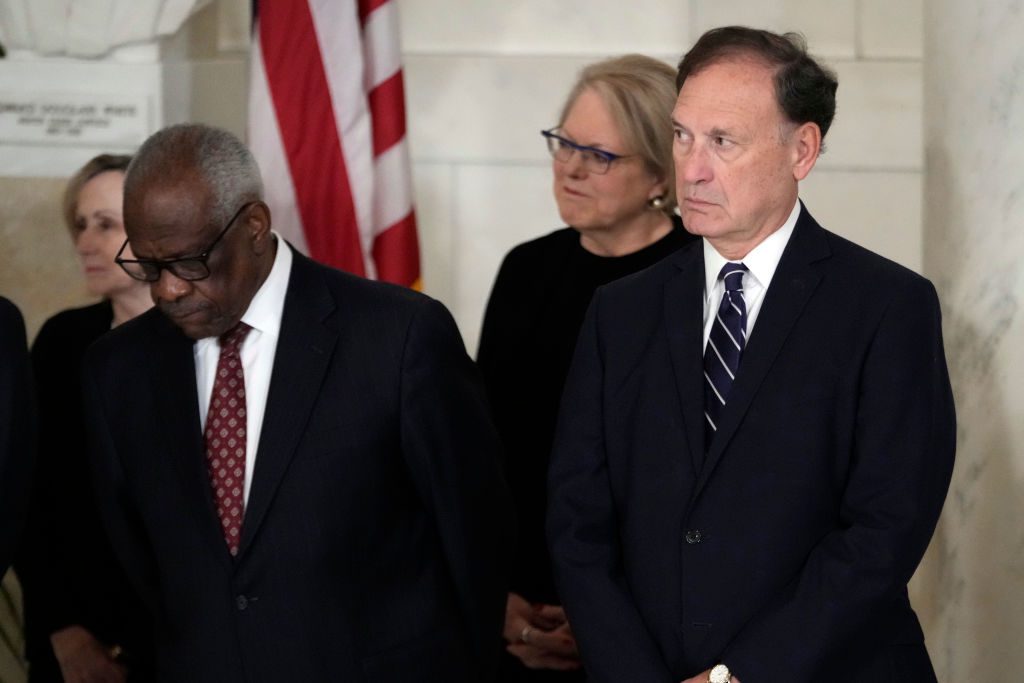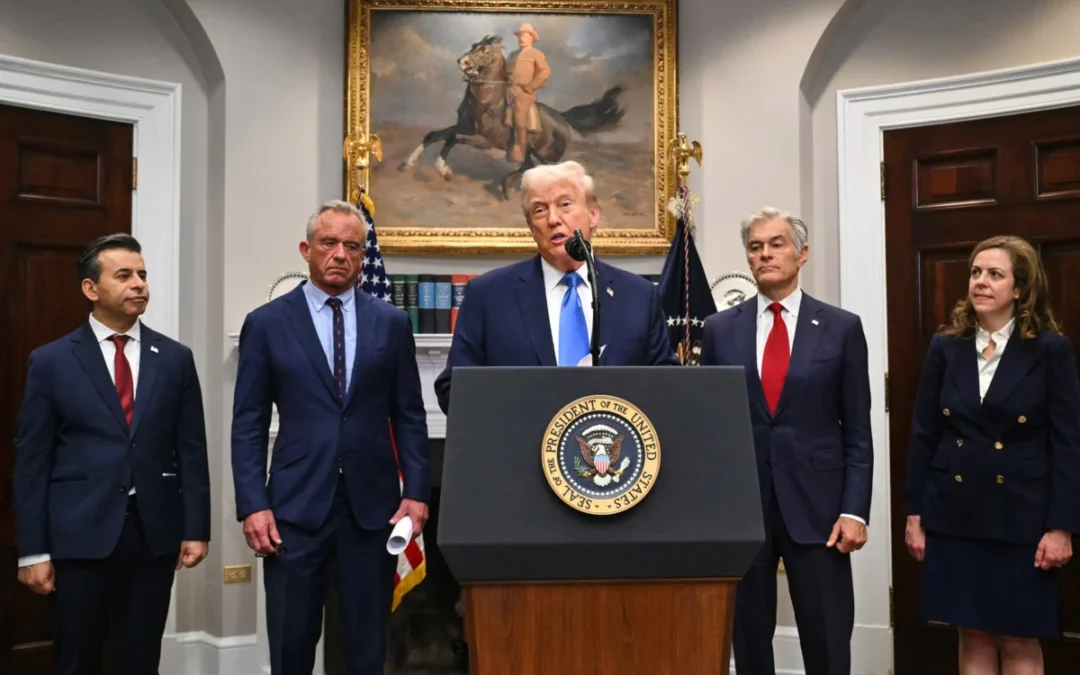
Supreme Court Justices Clarence Thomas and Samuel Alito attend a private ceremony for retired Supreme Court Justice Sandra Day O'Connor before public repose in the Great Hall at the Supreme Court on Dec. 18, 2023 in Washington, DC. (Photo by Jacquelyn Martin-Pool/Getty Images)
Harris and President Biden are calling on Congress to establish term limits and a more binding, enforceable code of ethics for Supreme Court justices. “These popular reforms will help to restore confidence in the Court, strengthen our democracy, and ensure no one is above the law,” Harris said.
Kamala Harris on Monday endorsed a new proposal to make major changes to the United States Supreme Court by instituting term limits and a more binding, enforceable code of ethics for the Court’s nine justices.
The plan, first announced by President Joe Biden in an op-ed in The Washington Post, comes amid growing distrust in the court and after several reports in recent years revealed that multiple conservative justices have accepted luxury travel accommodations and other gifts from right-wing billionaires.
“There is a clear crisis of confidence facing the Supreme Court as its fairness has been called into question after numerous ethics scandals and decision after decision overturning long-standing precedent,” Harris said in a statement backing the proposed reforms. “These popular reforms will help to restore confidence in the Court, strengthen our democracy, and ensure no one is above the law.”
The first proposal would establish term limits for justices, who since the nation’s founding, have served lifetime appointments. Instead, under the Biden-Harris proposal, justices would serve 18-year terms, and the president would appoint a new justice every two years.
“Term limits would help ensure that the court’s membership changes with some regularity,” Biden wrote in his op-ed. “That would make timing for court nominations more predictable and less arbitrary. It would reduce the chance that any single presidency radically alters the makeup of the court for generations to come.”
Biden’s second plan – a more binding, enforceable ethics code for the justices — would require them to disclose gifts received, to refrain from any public political activity, and to recuse themselves from any cases in which they or their spouses have a conflict of interest, financially or otherwise.
Although the Supreme Court implemented an ethics code last year, there is currently no enforcement mechanism. Because of this, Biden has called the code “weak and self-enforced.”
Biden’s proposal comes in light of media reports revealing that conservative Justices Samuel Alito and Clarence Thomas accepted gifts from wealthy donors.
ProPublica reported last year that Thomas failed to disclose a 2014 real estate deal between himself and Republican mega-donor and billionaire Harlan Crow, in violation of federal law. Another report from ProPublica detailed how Thomas accepted decades’ worth of luxury travel accommodations and other gifts from Crow. These trips included trips on the Crows’ yacht and private jet. Thomas did not disclose this travel either.
ProPublica also reported last year that in 2008, Alito accepted a luxury fishing trip from Republican donors and billionaires Paul Singer and Robin Arkley II. The report found that Singer later had multiple business disputes heard before the Supreme Court.
The court has also come under growing scrutiny in recent years for its increasingly partisan decisions that have upended longstanding precedents surrounding abortion, federal regulatory power, and voting rights, to name a few.
In a stunning decision, the Court last month also granted broad immunity to former president Donald Trump for any crimes he committed while in office. The court’s 6-3 ruling, which saw the court’s six conservatives side with Trump and the three liberal justices dissent, will almost certainly delay Trump’s upcoming trial to determine his criminal culpability in the Jan. 6, 2021 attack on the US Capitol.
These decisions have hurt the court’s reputation.
According to a survey from the Associated Press-NORC Center for Public Affairs Research released last month, 7 in 10 Americans now think that Supreme Court justices are more likely to be guided by their own ideology, rather than serving as neutral arbiters of government authority.
“Historically, the Supreme Court was the most popular and trusted branch of government, but recent ethics scandals and controversial rulings far outside the norm of basic American values have sunk public confidence in the Court to an all-time low,” Lisa Gilbert, co-president of Public Citizen said in a statement. “The dramatic drop in public confidence in the Supreme Court both undercuts the Court’s legitimacy and endangers the legitimacy of the judicial branch as a whole.”
Biden also highlighted the degradation of the court’s reputation and its growing illegitimacy among Americans.
“What is happening now is not normal, and it undermines the public’s confidence in the court’s decisions, including those impacting personal freedoms,” Biden wrote. “We now stand in a breach.”
In his op-ed, Biden also called for a constitutional amendment to address the court’s decision and clarify that no American — not even the President of the United States — is immune from prosecution for crimes committed while in office.
“I am calling for a constitutional amendment called the No One Is Above the Law Amendment. It would make clear that there is no immunity for crimes a former president committed while in office,” Biden wrote. “I share our Founders’ belief that the president’s power is limited, not absolute. We are a nation of laws — not of kings or dictators.”
The first two proposals would both require action from a divided Congress, and thus are unlikely to become law by the time Biden leaves office in Jan. 2025.
Republican House Speaker Mike Johnson said in a statement Monday that the president’s plan is “dead on arrival in the House.”
Biden’s proposed constitutional amendment is also more of a long-term play, given the difficulty of amending the United States Constitution.
One method of doing so requires two-thirds support in both the House and Senate. The other method requires a constitutional convention of two-thirds of state legislatures. Then for the amendment to be ratified, it would have to garner three-fourths support of state legislatures.
To put into context how rare this is, the Constitution was last amended in 1992, and has only been amended 27 times since 1787 when it was adopted.
Still, the Biden-Harris reform plan drew praise from judicial reform advocates on Monday.
“We applaud President Joe Biden and Vice President Kamala Harris for continuing to lead on the critical issue of defending and advancing our democracy,” Tiffany Muller, President of End Citizens United (ECU), said in a statement. “Justice for thee but not for me cannot be the modus operandi of the highest court in the land. It’s past time for Congress to enact meaningful reforms to the Supreme Court, including a binding and enforceable code of conduct and term limits.”

‘Sick to my stomach’: Trump distorts facts on autism, tylenol, and vaccines, scientists say
By Amy Maxmen Originally published September 22, 2025 Ann Bauer, a researcher who studies Tylenol and autism, felt queasy with anxiety in the weeks...

Conservative activist Charlie Kirk dies after being shot at Utah college event
OREM, Utah (AP) — Charlie Kirk, a conservative activist and close ally of President Donald Trump, was shot and killed Wednesday at a Utah college...

Dubuque pastor and state Rep. Lindsay James to run against US Rep. Ashley Hinson
Iowa state legislator Lindsay James is the third Democrat to challenge the northeast Iowa congresswoman in a race pitting kitchen-table economics...

Scholten suspends US Senate campaign, endorses Turek
The Democratic primary to take on Republican US Sen. Joni Ernst in 2026 has narrowed. Just one week after announcing his bid, State Rep. Josh Turek...

Paralympic gold medalist Josh Turek launches run against US Sen. Joni Ernst
The Iowa state representative, who won twice in Trump territory, is betting his story of overcoming adversity will resonate statewide. Josh Turek...

Democrat Jackie Norris launches US Senate bid against Joni Ernst
Norris launched her campaign, positioning herself as a problem-solver focused on "invisible burdens" like the mental health and childcare crises...




